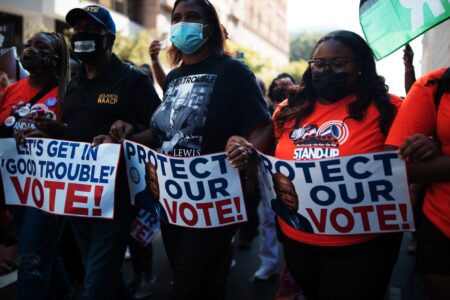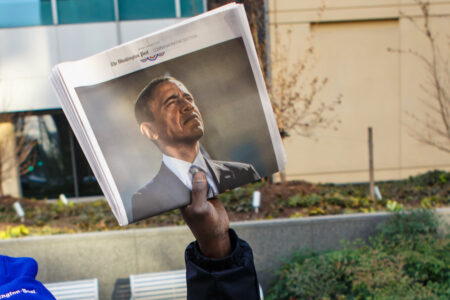As a slate of decisions was announced, the Supreme Court revealed on Friday that they will postpone deciding on Louisiana’s latest congressional map, creating a second majority-Black district.
Issued on the last day of the term, the decision means that further arguments must be made, placing the topic on the upcoming calendar. For now, the state’s map with two majority-Black districts will remain in place.
Justice Clarence Thomas dissented from the rest of the Supreme Court’s decision, saying that they should have landed on a ruling this term. It is unclear why the court wishes to hear oral arguments again next term.
The case was brought to the Supreme Court after a group of voters argued that the new map unconstitutionally took into account race when drawing the district lines. Although Black citizens make up one-third of the state’s population, the previous map only provided one majority-Black district.
After a series of court rulings, the Republican-controlled legislature redrew the map to create a second majority-Black district while also protecting the seats of Republican lawmakers, Speaker Mike Johnson and Majority Leader Steve Scalise.
A group of voters, who self-identify as “non-African-American voters,” are attempting to label the new district map as a “racial gerrymander.” As the map was upheld by the Supreme Court last year, the voters are claiming that the map cost Republicans a seat. Democrat Rep. Cleo Fields won the new district.
With the latest decision from the Supreme Court, some legal officials are predicting a shift in the interpretation of the Voting Rights Act, a landmark 1965 legislation that prohibits racial discrimination in the voting process.
“Voting Rights Act watchers have been predicting a major shift around the Voting Rights Act for over a decade,” said Case Western Reserve University law professor Atiba Ellis to NPR. “The fact that the Court is rearguing Louisiana v. Callais may mean there is deep debate and a potential major decision upholding – or striking down – the Voting Rights Act.”
The U.S. Supreme Court isn’t ruling yet on Louisiana’s new congressional map, keeping it in place for now but asking for more arguments.
— WWL-TV (@WWLTV) June 29, 2025
Read more: https://t.co/nZRJV8YeUK pic.twitter.com/q8Z3LK7Soy
The latest announcement comes a month after a federal judge ruled in favor of Black voters in a similar case involving Alabama’s 2023 congressional map. In 2023, the state legislature drew up a map that mirrored the one from 2021 whichwas rejected by the judges and the U.S. Supreme Court for diluting the power of Black Alabama voters. The map drawn up included only one majority-Black district.
In the latest ruling, the three-judge district court ruled that, when submitting the same map with one majority-Black district, the legislators violated Section 2 of the Voting Rights Act by creating a map that constitutes an illegal racial gerrymander.
“This win is a testament to the dedication and persistence of many generations of Black Alabamians who pursued political equality at great cost. We stand on the shoulders of our predecessors,” said the plaintiffs of the case upon the judges’ decision. “We know that all Alabamians will benefit from today’s victory just as we have benefited from the work of others. We hope our win will benefit Black voters in the rest of the country as well.”
With the latest ruling, the Alabama legislators are expected to file an appeal. The state attorney general office has already said that “all options remain on the table.”











